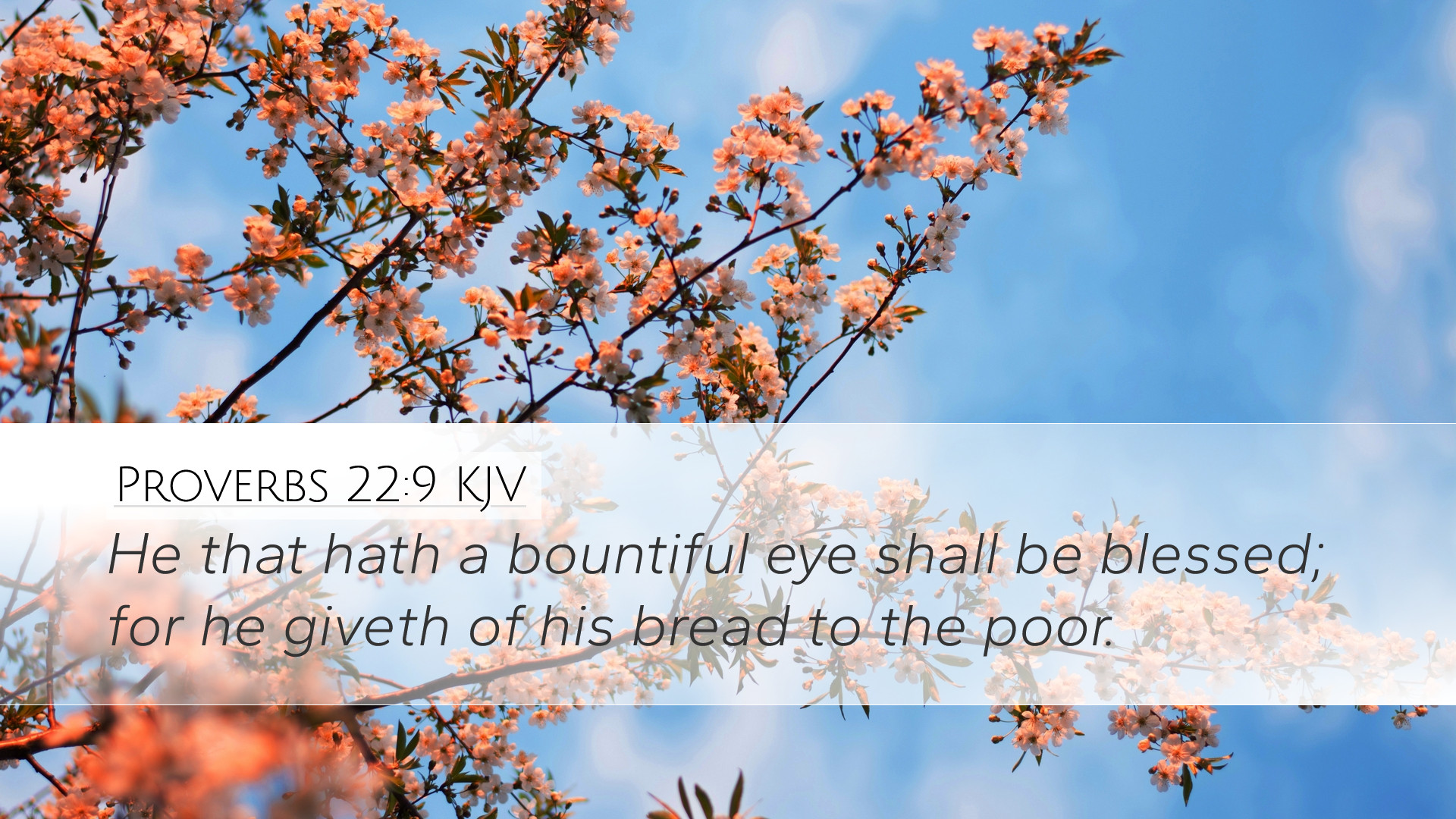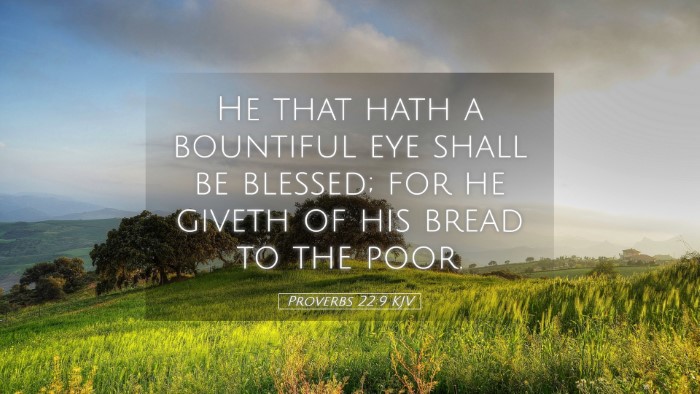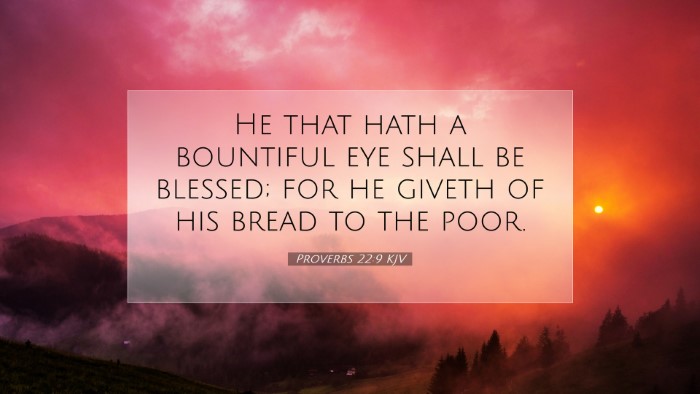Commentary on Proverbs 22:9
Proverbs 22:9 states, "He who has a generous eye will be blessed, for he gives of his bread to the poor." This verse encapsulates powerful principles of generosity and the blessings that flow from a compassionate heart. Here we draw insights from respected public domain commentaries, including those from Matthew Henry, Albert Barnes, and Adam Clarke, to unpack its meaning and relevance.
Understanding the Generous Eye
The phrase "generous eye" suggests a mindset characterized by compassion and awareness of others’ needs. Henry notes that a generous person is one who looks upon the needs of the needy and responds with an open heart and hand. This "eye" conveys a spiritual perception that enables one to see beyond their own circumstances and acknowledge the plight of others.
Barnes emphasizes the need for vision in generosity. He suggests that the one who has a "generous eye" is not merely reacting but is proactively seeking opportunities to bless others. Such individuals are keenly aware of those who suffer poverty and distress, thus positioning themselves to help.
The Blessing of Generosity
The passage promises that those who exercise this kind of generosity will be blessed. Clarke explains that the blessings referred to are multifaceted. They may manifest as material provisions, spiritual growth, or even emotional fulfillment. The act of giving often increases what one has because, as the scripture supports, "there is that scattereth, and yet increaseth." (Proverbs 11:24)
Henry adds that the blessed state of the generous is not merely in material terms but in spiritual satisfaction and divine favor. God honors those who honor the poor, leading to an inevitable reciprocal blessing.
Giving of One's Bread
The verse speaks specifically of giving of one's bread, a metaphor for sharing what one holds most necessary for life. This implies that the best kind of generosity is sacrificial. Barnes reflects on the significance of bread as sustenance, indicating that those who share their vital resources demonstrate the true essence of love and care.
Clarke points out that giving bread symbolizes sharing one’s daily sustenance, implying that the act is not just of surplus but of personal sacrifice. True generosity often comes at a cost to oneself, reflecting the nature of Christ’s love, who gave His life for humanity's sustenance—spiritual bread.
Implications for the Community
This teaching carries communal implications. When individuals within a community adopt a generous eye, they contribute to the welfare of the whole. Henry indicates that generosity fosters a spirit of unity, as the one who gives aligns themselves with God’s purposes in caring for the vulnerable. When the poor feel the hand of generosity, it builds a society rooted in love and mutual respect.
Barnes reinforces this communal aspect, suggesting that community thriving is contingent upon its ability to care for one another. In a world where individualism often reigns, Proverbs 22:9 beckons believers to rise above personal interest to consider collective well-being.
Spiritual Dimensions of Generosity
Examining the spiritual dimensions, Henry asserts that the act of giving reflects a heart that has been transformed by grace. It is an outpouring of the love that has been experienced personally. Thus, the generous person isn't simply acting out of duty but from a deep-seated desire to mimic God’s own generous character.
Clarke also notes the connection between generosity and divine approval. Generous acts signify a faithful steward who understands that all possessions are ultimately God’s, and what one shares is merely returning to the source that provided it. This understanding invites a deeper relationship with God as one learns to depend on Him for their needs while extending grace to others.
Challenges to Generosity
Despite the clear admonition towards generosity, practical challenges remain. The modern context is one where busyness and self-interest can overshadow one's ability to see and act. Barnes suggests that people often turn a blind eye to the needy, influenced by societal pressures and a focus on personal ambition.
Henry warns that the lack of generosity can lead to spiritual barrenness. When individuals hoard their blessings rather than share them, they risk stagnating in their faith and relationship with God. The antidote is cultivating a habit of looking for opportunities to give and serving as a conduit for God's love.
Conclusion
Proverbs 22:9 serves as a timeless exhortation to embody a spirit of generosity fueled by compassion and graciousness. As presented through the commentaries of respected scholars, the rewards of generosity extend beyond mere material gain to encompass spiritual richness and community flourishing. By adopting a "generous eye," believers are called not only to fulfill individual responsibilities but also to contribute to the overall health of the Church and society.
In light of this verse, pastors, students, and theologians are prompted to reflect deeply on their personal practices of generosity and encourage others to engage in this vital and rewarding aspect of Christian living.


